Okay, so not really a secret. But these treats are perhaps less known to tourists than other local specialties might be. Many convents in Spain (and perhaps other countries) sell cookies and many have been doing this for centuries. Sometimes they use secret recipes the nuns have perfected for a very, very long time. Which makes it even more of a reason to seek these cookies out. It is probably your only chance to taste and enjoy this particular cookie.
Why do the nuns sell cookies? They have long sold their products to support themselves and their way of life. Nuns in Spain are particularly known for their cookies. And the rest of the world is slowly discovering their sweets too. Which is a win-win for all. Buyers get treats made from perfected, and perhaps even locally famous recipes. The sales from these gourmet products help pay for the upkeep of the beautiful monasteries, as well as helps to pay for some of the necessary expenses of its inhabitants.
Buying Nun Cookies in Madrid
So while ‘nun cookies’ are not unique to Madrid or any single monastery, my family’s first encounter was at the Corpus Christi monastery (Las Carboneras) in Madrid. This monastery is centrally located, really close to Mercado de San Miguel and Plaza Mayor, which are probably already on most Madrid itineraries. So it makes adding a stop to buy cookies from the nuns very easy. The main thing to note when adding this to your plan is the limited opening times. They were closed when we visited the first time, and we had to return later in the day when they were open. It wasn’t a problem for us since we were staying in Madrid for a few days, but if you have limited time, its good to know the opening hours in advance. The Monasterio del Corpus Christi sells cookies from 9:30am to 1pm, and then again from 4:30-6:30pm (at the time of our visit).
We heard about “secret nun cookies” when we watched one of the many videos we watched in preparation for our trip to Madrid (I can’t remember which one or I would give them credit here). I used Google to find the address of the monastery, and used Google Maps to get walking directions from Plaza Mayor when we were visiting. We didn’t have any trouble finding it. The monastery dates back to 1607, and is at the end of the Plaza del conde Miranda. The convent shop is called Venta de Dulces Monjas and is known to Google Maps.
Our top secret cookie purchase
This was a planned purchase for us. We knew in advance to have cash, as the nuns accept cash only. The cookies cost 12-13 EUR for 1/2 kilo, and 24-26 EUR for 1 kg. We also knew that we would make the transaction contactless — you never see the nuns that are selling you the cookies! So the whole transaction feels quite discreet and special.
The Monasterio del Corpus Christi offered the following cookies when we visited:
- Galletas (lemon flavored cookies)
- Sequillos (dry cookies made from flour, eggs, and oil)
- Nevaditos (powdered sugar shortbread cookies)
- Naranjines (orange flavored cookies)
- Pastas de Te (tea biscuits)
- Pastas de Almendra (almond cookies)
- Mantecados de Yema (egg yolk shortbread cookies)
- Mantecados de Jerez (sherry shortbread cookies)
We bought 1/2 a kg of the Nevaditos. We probably should have bought one of each so I could make a recommendation. For what it’s worth, all 6 of us liked the cookies we got and 1/2 a kg is a lot of cookies.
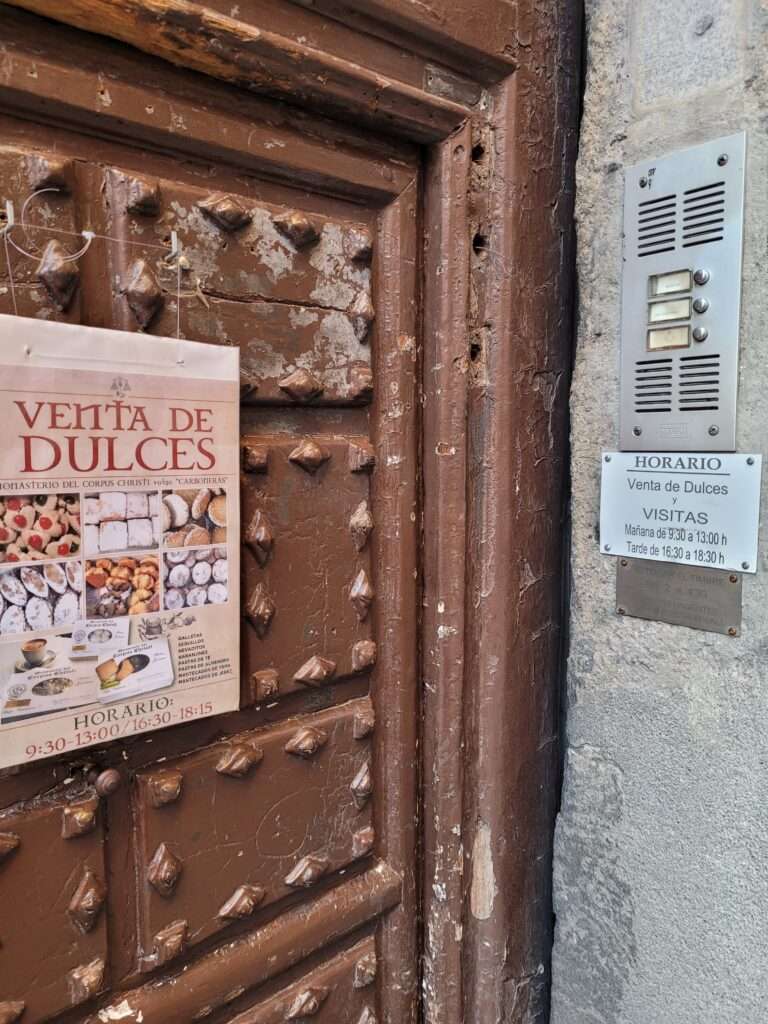
Step 1: Exterior door where you need to go if you want to buy cookies from the nuns. Buzz the button that says MONJAS (nuns) and you can say “dulces” which is Spanish for sweets.
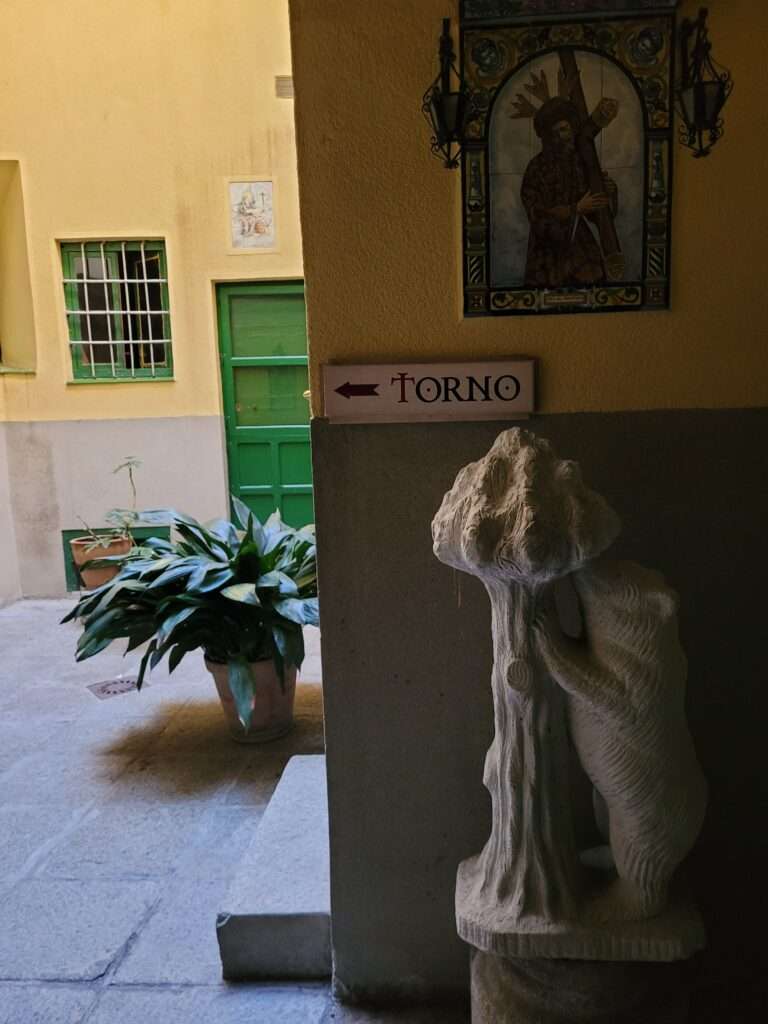
Step 2: Once they let you inside, we followed the sign TORNO to the turn table where we could buy the cookies.
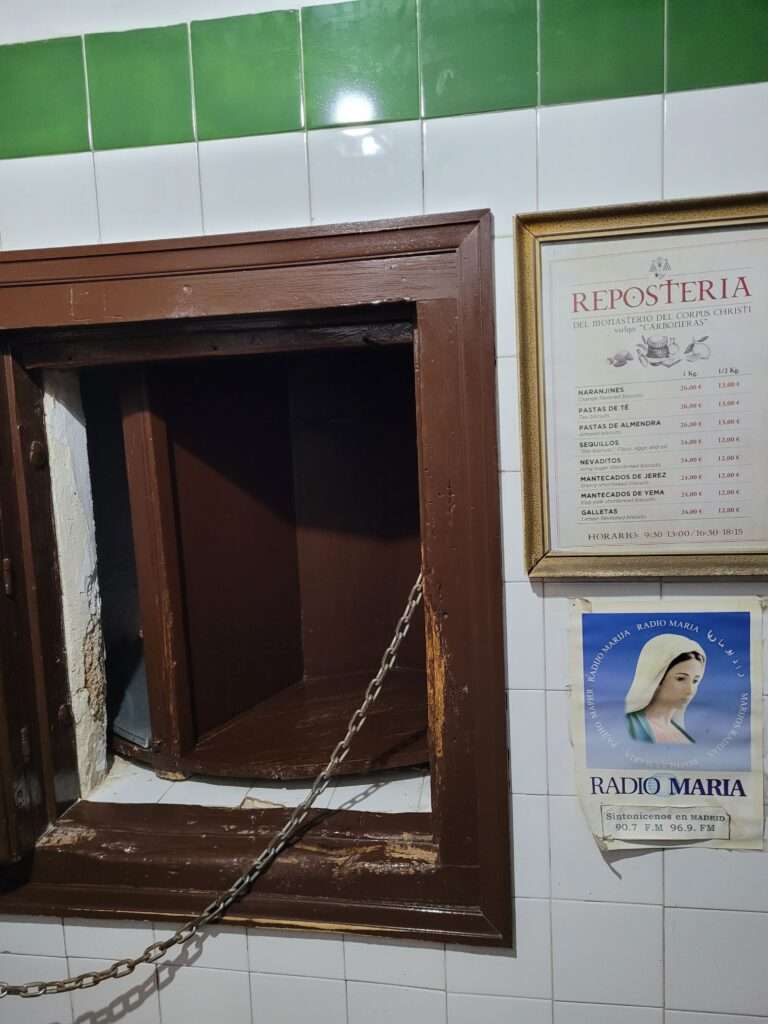
Step 3: Tell the nuns the cookies and size you want. We said “half kg nevaditos” but you can say “medio kilogramo” in Spanish. Put the money in the turnstyle and turn.
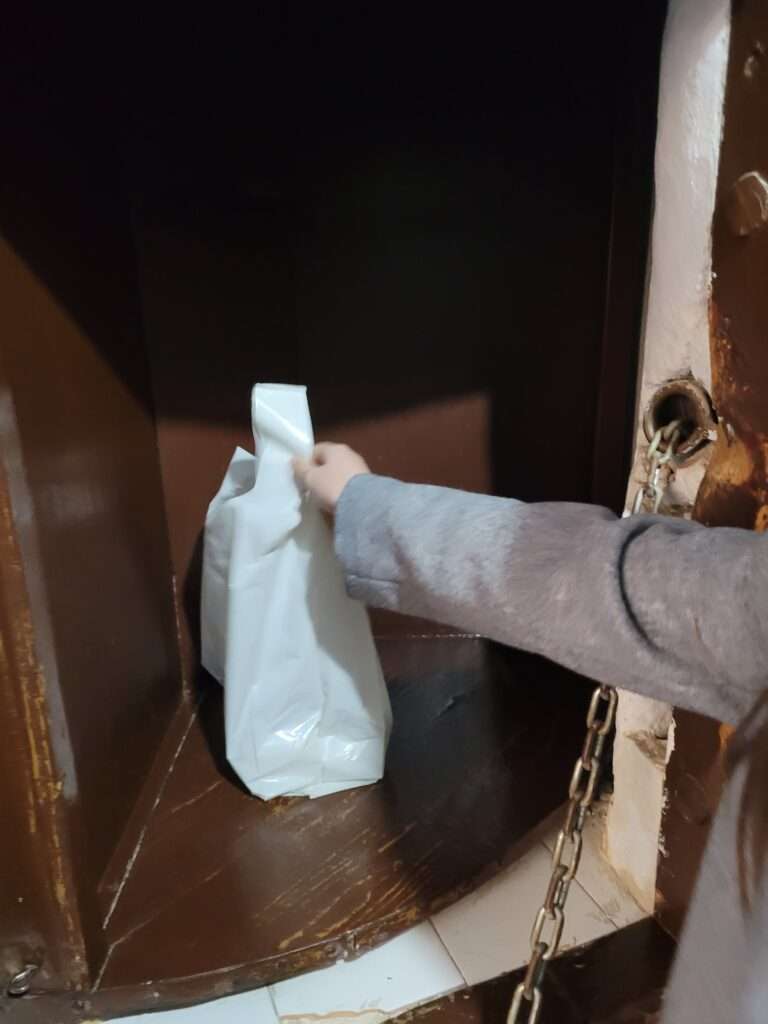
Step 4: Wait a moment for the nun to replace your money with the cookies and spin the turnstile back to you. Now you have your cookies!!!
Okay, we were admittedly pretty excited to have pulled our “secret nun cookie” purchase off without any hiccup.
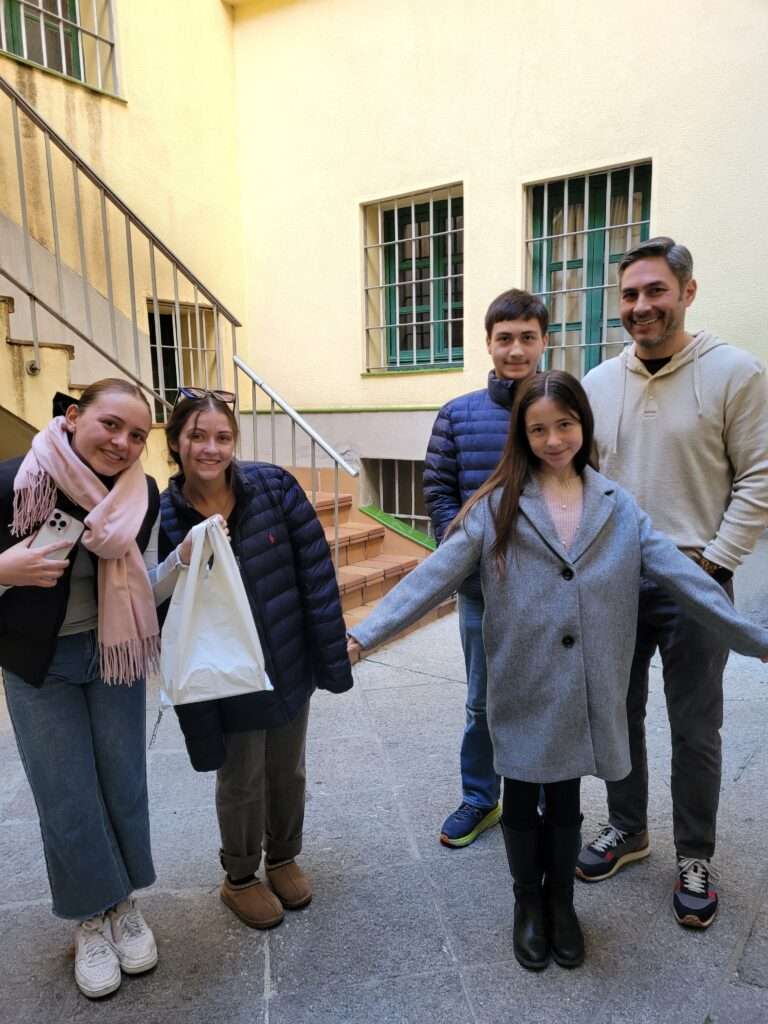
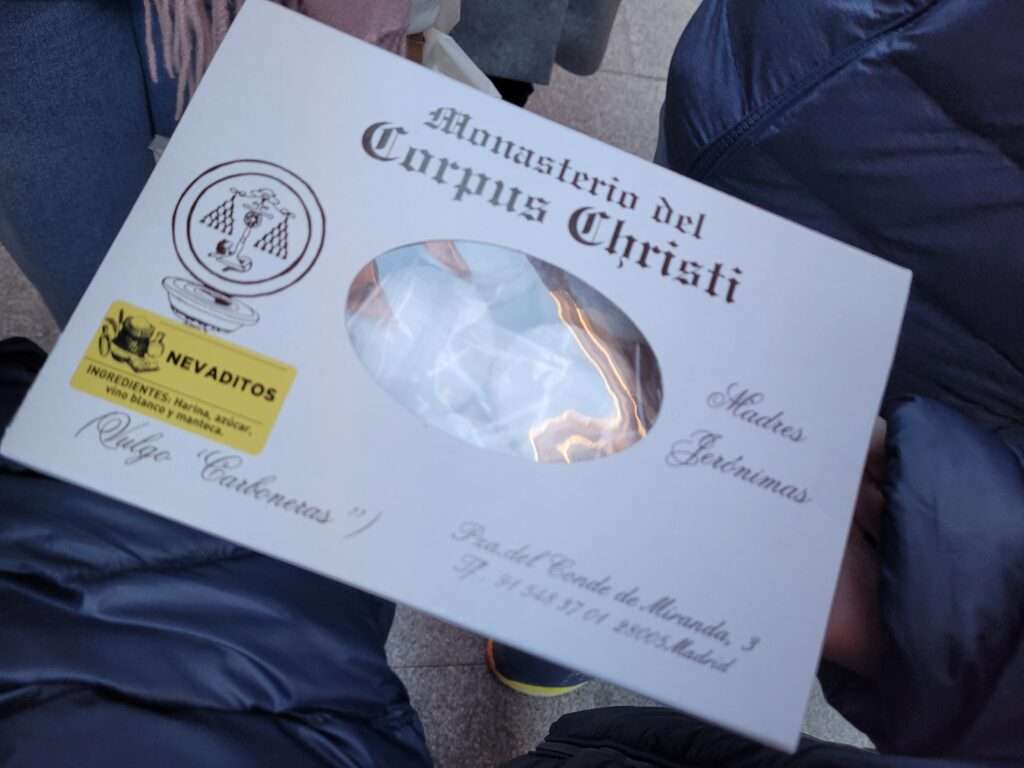
Photo above: This was the box of Nevaditos we retrieved from the unassuming bag we received in the turnstile. It actually felt special eating the cookies out of this box.
It's a Spanish thing
While nuns in other countries, such as Portugal or Central/South America might also sell “nun cookies,” the point I want to make here is that these cookies can be found at convents and monasteries across Spain. Not just Monasterio del Corpus Christi in Madrid. We are planning a trip to Barcelona/Valencia/Zaragoza in a few weeks and I have already seen mention of nun cookies for these areas. So if you think these cookies sound fun, you can easily google the town in Spain you are visiting and the word “nun cookies” or “dulces conventos” and see what pops up. Chances are good you probably won’t be too far from a local convent or monastery selling cookies.
Locations in Spain
While this is not meant to be an exhaustive list by any means, I thought it might be helpful to share the names and addresses of some of the monasteries and convents in Spain selling cookies. In reality, I wanted a list for myself, so I figured I could post it here too. I also found that some sell their goods online if you want to order something special straight to your home.
- Convento de San Diego de Alcalá de Henares, Alcalá de Henares, Spain. Read more here.
- Monasterio de Santa Teresa de Jesus, Avila, Spain. Learn more here.
- Monasterio Cisterciense Nuestra Senora de Vico, Barcelona, Spain. Learn more here.
- Santa Maria de Jerusalem, Barcelona, Spain. Read more here.
- Caelum, in Barcelona. While not itself a convent, it sells products from monasteries conveniently located in Barcelona. This is a chance to shop products from various artisans in one place.
- Convento de San Pablo, Caceres, Spain. Learn more here.
- Convento Santa Clara, Cordoba, Spain. Read more here.
- Monasterio de la Inmaculada Concepción, Chinchón, Spain. Read more here.
- Convento de Santa Catalina de Zafra, Granada, Spain. Read more here.
- Comendadoras de Santiago, Granada, Spain. Read more here.
- Corpus Christi Monastery (Las Carboneras), Madrid, Spain.
- Monasterio Nuestra Senora de la Piedad, Palencia, Spain. Learn more here.
- Convento de Santa Paula, Seville, Spain. Read more here.
- Convento de Santa Ana, Seville, Spain. Read more here.
- Convento Madre de Dios de la Piedad, Seville, Spain. Read more here.
- Monasterio de San Clemente, Seville, Spain. Read more here.
- Convento de San Leandro, Seville, Spain. Read more here.
- Convento de Santa Ines, Seville, Spain. Read more here.
- Convento de las Clarisas de Valdemoro, Valdemoro, Spain. Read more here.
- Convent of the Discalced Carmelites of San José de Maluenda, Zaragoza, Spain. Read more here.
- Monastery of Santa Catalina, Zaragoza, Spain. Read more here.
- Convent San Clemente, Toledo, Spain. Learn more here.
It is always good to doublecheck these before including them in your itinerary to be sure they are selling cookies when you visit. Things may have changed since I made the list.






